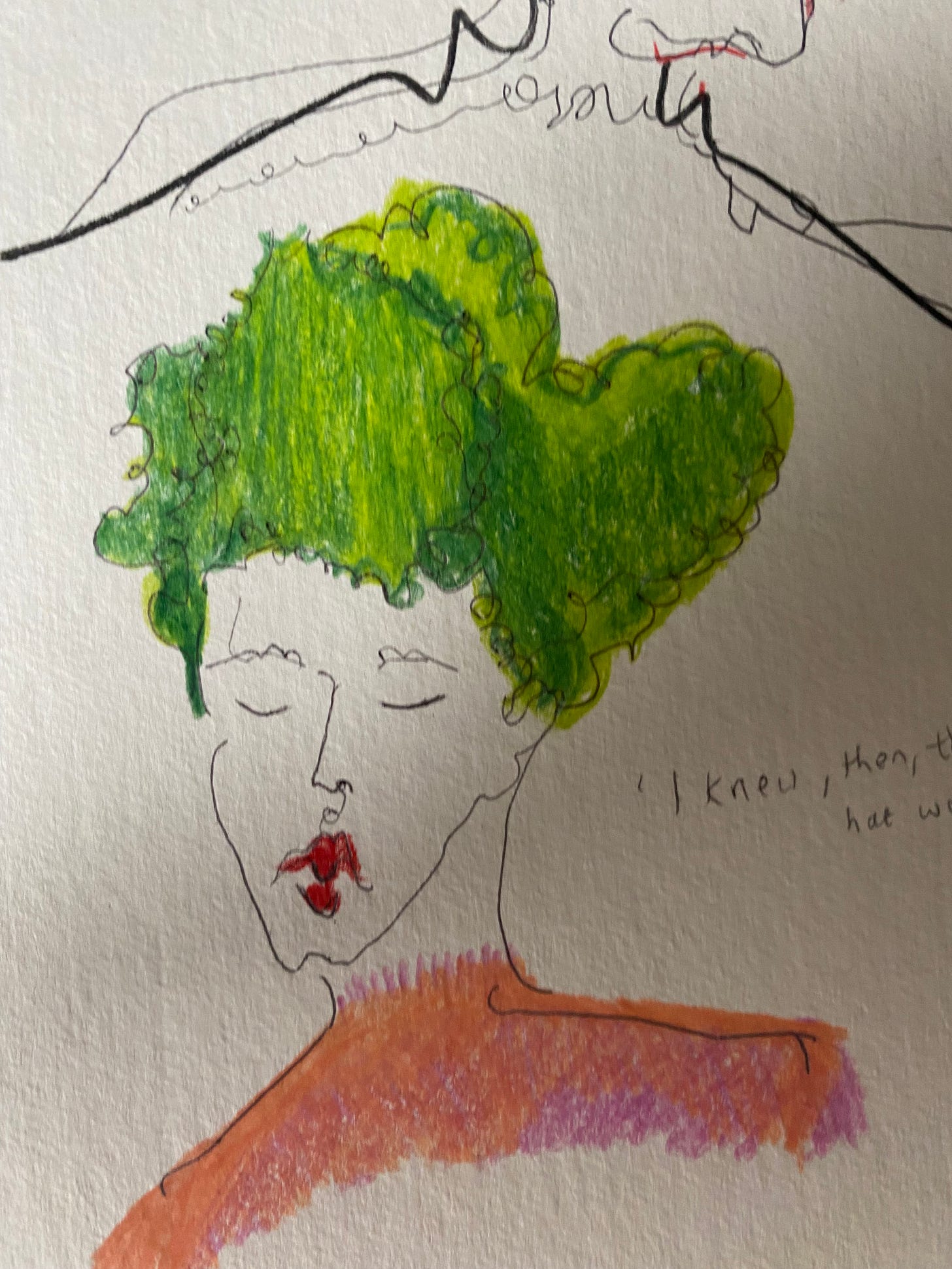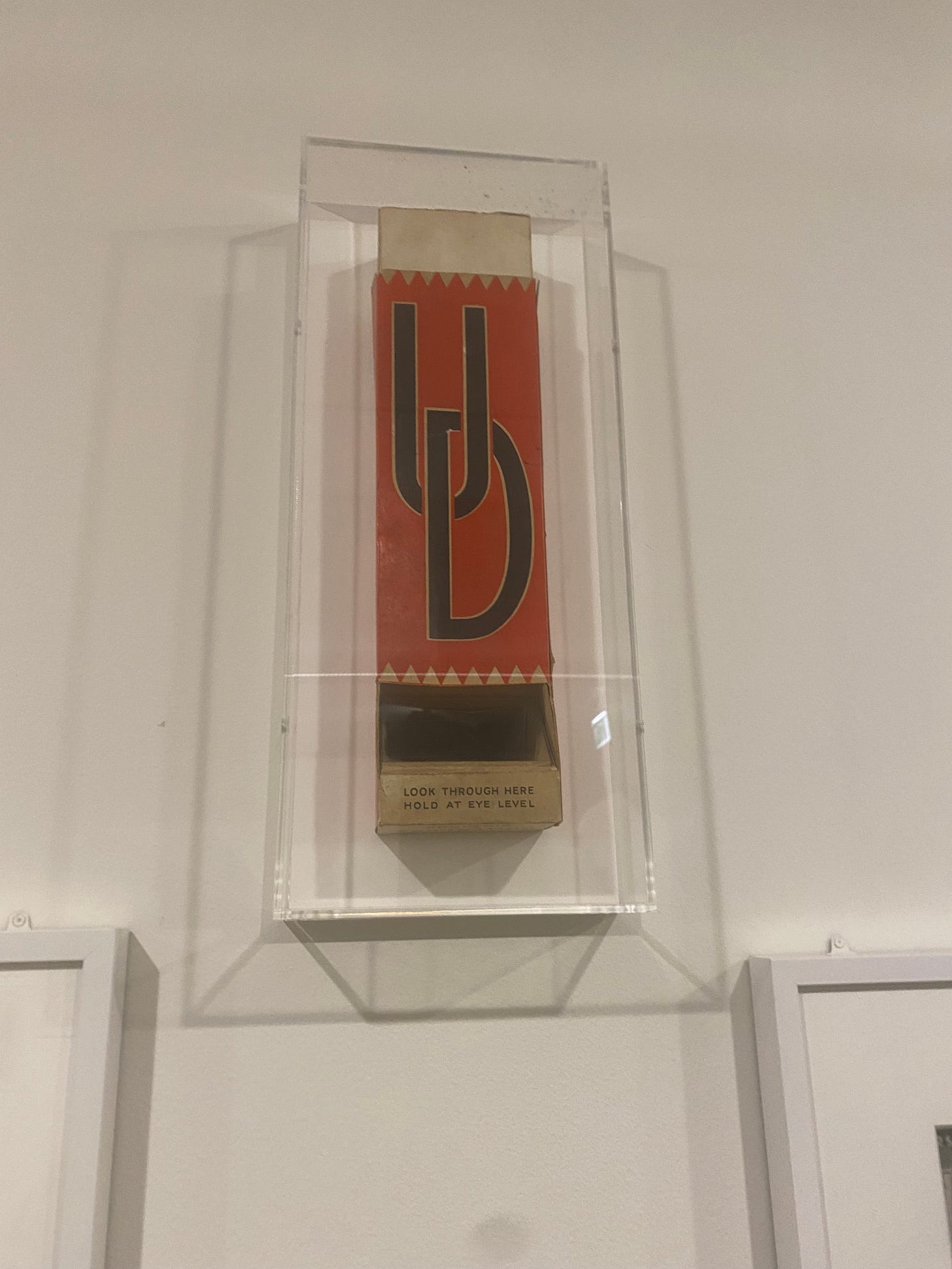Dear Friend,
I hope you’re having a good summer, and thank you for your patience with the slightly offbeat rhythm of my letters at the moment. As I’ve written about before, and as you probably know, summer here is a much more pronounced thing than it is in the UK because most people take several weeks off at this time of year. Locals leave the city and visitors from everywhere else in the world arrive in large numbers. Because I am self-employed, I rarely take time off in the same way over summer, and being out of sync with the general tide of Parisians makes me feel vaguely off-kilter at this time of year. We will return to the usual weekly reliability in September.
The weather over the last few days here in Paris has been on the claggy side – constantly warm and humid, sometimes very sunny, and occasionally very rainy. It’s unpredictable but overall very liveable compared to some of the extreme weather further south on the continent.
Last week I went back to school, albeit briefly. I am at the beginning of the long process of applying for French nationality, a long-held ambition of mine since the UK voted to leave the EU. Like most official processes in France, this involves the assembling of a big old ‘dossier’, a file with all the relevant (and much of the irrelevant, for that matter) paperwork. One of the elements required is a certificate from an official language-assessment centre saying that your French is passable enough for a passport.
The examiner was a chic middle-aged French woman dressed all in white. She asked me to introduce myself and then explained that we would engage in a role play. I was to play a new customer at a ‘wellbeing centre’ and had to choose from their list of services — massage, facial and yoga classes. It was a strange way to spend a Wednesday morning.
The next part of the test was on a computer that reminded me of the ones we used in my primary school ICT classroom around the year 2000. It involved various listening and reading exercises, and then typing out some letters to friends, for which I was naturally very well prepared thanks to our correspondence.
Before I was your mother, I was a woman!
Last weekend I met some friends for a picnic by the river on the Ile Saint Louis. The event was on the initiative of my friend Rosie, whom I have written about here before. Most recently, I wrote about how she is the queen of mastering French holiday allowance, always artfully juggling days off and bank holidays to plan jolly jaunts out of town. (Fitting, then, that she organised our jaunt by the Seine).
Hailing from Yorkshire and with a very dry, verging on merciless, sense of humour, Rosie is extremely British, yet she is also extremely French. She acquired French nationality a few years ago (after acing above test) and she has lived in Paris more or less from when she graduated from university, excepting a short interlude in London, which she often says she would never repeat!
Rosie is always an interesting commentator on matters of French culture and has some fantastic anecdotes. This has only become truer as she has become a parent of two young Franco-British children in recent years.
While Rosie works her last couple of weeks before heading out on vacances she has enrolled her daughter in what in the UK we would probably call ‘play scheme’, run by her child’s school. My British friends with young children have regular updates from nursery with news each time their kid eats, goes to the toilet, interacts with other children. Perhaps more updates than they want or need. In contrast, according to the stories Rosie told us, the approach for the French is more loosey-goosey.
The play-scheme groups go on lots of day trips. It’s always a very cute sight to see them in Paris, arranged in pairs with bright high-vis jackets, or gilets jaunes (not related to the protest movement). The school shares a programme of the proposed activities with parents but, according to Rosie, the parents don’t necessarily know which activity their child will be doing on which day. Instead, Rosie says, she gleans details from her daughter’s descriptions of her day.“We got on a Metro and then the bus, then we saw some pictures!”.
I am not the first to observe that British and French parenting styles are quite divergent. A comedian called Tatty Macleod, who is British but grew up in France, does some great skits that contrast a British mother with a French mother. One of my favourites is set on a beach holiday. The British mother, covered in a conspicuous layer of sun-cream, worries about her child playing by the sea, being too exposed to the sun etc. In contrast, the French mother looks chic in a bikini and shades. A cigarette in one hand, she encourages her child to go play somewhere else on the beach and give her some peace. “Remember that before I was your mother, I was a woman!”, the French mother says.
As this sketch typifies, French parents tend to have a more laissez-faire attitude to childcare, in some respects at least. To some degree, children here are meant to fit in with their parent’s lives, rather than the other way round. A friend who is heavily pregnant told me there was a whole section in her prenatal class dedicated to how to maintain your social life after the baby is born. (When you give birth in France, you are also offered anatomical ‘reeducation’ sessions to ensure the continued quality of your pelvic-floor muscles.)
Parents do seem to have more choices about their leisure time in part because childcare here is simply more affordable than in the UK. Municipal crèches are priced on a means-tested sliding scale, and even private nannies are subsidised by the state.
And then when it comes to education, the French way is generally more rigorous and strict, versus the more relaxed, positive approach we take in the UK. This seems in a sense to be a contrast with the attitude to childcare/health and safety, but it also comes from the same philosophy that a child should fit in with the system vs. the system should bend to the child. Tatty Macleod also has a great sketch on this, where she contrasts a British mother’s reaction to her child receiving a bad mark at school: “Well I couldn’t do this, far too difficult! We shouldn’t have exams anyway, this is why there’s a mental-health crisis!”. Vs. the French mother: “Oh la la, c’est la merde, hein!”
The mild, lumpy faces of the British (a vignette)
My dear friend
is in town at the moment. She is also a writer and has a wonderful podcast called In Writing and an accompanying Substack . As well as being very clever and funny, she is also very beautiful, so the title above does not relate to her personally.Hattie did however suggest going to see a themed exhibition at the Henri Cartier-Bresson Foundation, which opened in May to coincide with the coronation of Charles III (closes September 3). The small exhibit features the famous French photographer’s pictures of the coronation of Charles’s grandfather, King George VI in 1937, and more particularly the crowd at the coronation.
Cartier-Bresson, born to an affluent family in Paris in 1908, was a pioneer of street photography and was one of the founders of the picture agency Magnum Photos. He was interested in painting and drawing, then studied briefly at the University of Cambridge before serving in World War Two. Early in the war he was taken as a prisoner by the Germans and later, after France was occupied, he worked as part of an underground unit to document the last months of the occupation. Throughout his life, he was concerned with reportage and took a humanist approach to his work. (Side-note: Have you noticed that we don’t use the word ‘humanist’ very much anymore in modern discourse?).
The photographs featured in the Paris exhibition were printed in Communist publications Ce Soir and Regards and and would have been admired by the readers for the way they turned the gaze from the monarch to the ordinary people watching.
The images are full of life and capture a bygone era when people were always smartly turned out and when, charmingly, cardboard periscopes were sold so that spectators could get a good view in a crowd!
Among all this, Hattie and I also enjoyed the not always flattering descriptions in the photo captions.
Thirty-second book club
I finished Charles Dickens’ A Tale of Two Cities, which I thoroughly enjoyed. That man sure knew how to spin a yarn! Though the Paris he wrote about was the Paris of 1789, and he was writing some 80 years after that, with its larger-than-life characters, it still feels somehow familiar. The same goes for the depiction of London, with its businesslike order, but also its eccentricities.
Thank you for reading this letter about language tests, childcare and street photography!
I hope you have a lovely week and are staying as warm/cool as possible, wherever you are.
Yours,
Hannah









Great fun read Darling Hannah!
Lumpy British faces! Lololol! As Iam part Italian part English I guess I have to own a lumpy and oily face! Heh heh! Hope that you too are enjoying this rather dramatic summer, with its raging fires and scorching temperatures. Here in The Highlands we are suffering mist and rain with staggering temperatures of up to 16 degrees celsius🌞 however, lots of marvelous wildlife on the loch, seals dolphins and baluga whales, sea eagles, oystercatchers and all sorts of land and sea birds.
Midge apocalypse requiring keeping inside and enjoying beautiful 40 year ols Scotch whisky.
and fruit cake.
Miss the wonders of Paris and delighted to learn that hopefully you are now a fully incorperated French citizen.love to Babs and to you x
This newsletter was worth the wait; no apologies necessary. The revelations inspire investigation. Possibly the British faces could be lumpy and claggy? Lol!
You have friends as marvelous as yourself. Just write whenever:
"And there was that poor sucker Flaubert rolling around on his floor for three days looking for the right word."
Dorothy Parker